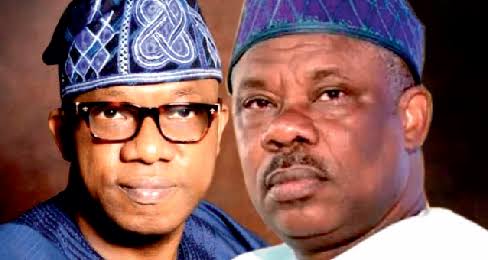Opinion:
BY TUNDE BELLO
I was taken aback upon reading an article by Seye Abodunrin that praises Ogun State Governor, Prince Dapo Abiodun, titled “Dapo Abiodun and Burden of Inherited Infrastructure Deficit.”
I must express my disappointment with the writer for what appears to be a biased article. It is particularly disheartening that Mr. Abodunrin writes from Ijoko, an area known for its neglected infrastructure and an abandoned historical road network initiated by former Governor of Ogun State, Senator Ibikunle Amosun, which Dapo Abiodun has not continued.
It should be noted that Senator Amosun did not intend to leave such crucial projects incomplete, unlike what the current Governor has unfortunately allowed to happen due to time constraints.
Amosun deserved credit for initiating the modernization of Ogun State. His administration laid a solid foundation that has been widely acclaimed by the people, both within and outside the state, for its enduring and effective results.
He was a visionary leader, adept at managing resources, and history will judge his tenure favourably.
I find it perplexing that the writer alleges one-sided development during Amosun’s administration. I dare say that Abodunrin’s criticisms of Amosun’s developmental efforts demonstrate a severe misjudgment, shared by his supporters, regarding Amosun’s plans for the state capital and beyond.
Amosun was known for his urgency. His dedication and daily activities were fueled by passion, tremendous energy, and a drive to position the state among the best in its class.
However, his political strategy faltered, preventing his successor from continuing the robust programmes that would have accelerated Ogun State’s growth and development, much anticipated by its citizens.
Yet, one cannot deny the widespread impact of Amosun’s initiatives across Ogun State. Consider the significant developments like the two bridges in Ijebu-Ode, aimed at mitigating risks on the Ijebu-Ode Expressway.
Similar progress is evident in Shagamu, Ijebu-Igbo, Ilaro-Yewa, and notably, the impressive network of link roads connecting Sango to Berger near Lagos.
This extensive road network spans numerous populous communities such as Ijoko, Agbado, Lambe, Akute, Adiyan, and their neighbours. Its proximity to Lagos, Nigeria’s commercial center, underscores its substantial socio-economic benefits for the people of Ogun State and beyond.
A significant hub of development could have emerged from this corridor, further enhancing the state’s revenue.
Opposition groups, setting aside their differences, openly acknowledged the former Governor’s remarkable efforts in advancing Ogun State beyond its previous limits.
Even Mr. Segun Sowunmi, the PDP gubernatorial candidate, reveres this era, possibly inspired by Amosun’s achievements to contest in the 2023 elections.
Abodunrin should understand that governance is a continuous process.
If neighbouring states like Lagos can successfully continue and build upon their predecessors’ projects, resulting in substantial development and ongoing benefits, then this model should certainly be replicated in Ogun State.
This is why even the most critical observers continue to applaud Asiwaju Bola Ahmed Tinubu, former Governor and now President, for the transformative strides witnessed during his tenure in Lagos.
The legacy has continued by Fashola and others, ensuring that Lagos (“Eko”) has become a benchmark not just for Nigerian states but for regions worldwide seeking development models to emulate.
A prime example is Senator Adam Oshiomhole, who as Governor of Edo State, studied Fashola’s approach in Lagos with the intent to replicate similar successes in his own state.
Let’s set aside the strategic advantages of Lagos for a moment. In my view, even with those advantages, without a well-structured plan and unwavering commitment from its leaders, the remarkable development witnessed in Lagos today would have remained a distant dream.
I had the opportunity to review Amosun’s master plan for Ogun State, spanning from Kara market in Berger area of Lagos to the Ijebu and Ilaro-Yewa axes, including Ota. It’s clear that nothing could have accelerated the development of his homeland better than this comprehensive vision.
Regrettably, many indigenous people of the state now lament not voting for Akinlade, Amosun’s chosen successor. This sentiment is compounded by the sorry state of the state’s internal road network – riddled with neglect, lacking maintenance, and crying out for attention, which the current administration has failed to adequately address.
While Governor Dapo Abiodun may point to achievements like school constructions, bridge projects, or road developments across the state, the recent heavy rainfall and resultant flooding, which claimed lives, exposed significant shortcomings.
Former Governor Amosun had envisioned replicating Dubai’s success in Ogun State. He admired Dubai’s rapid transformation within just 20 years and questioned why such a feat couldn’t be achieved in Nigeria.
I would like to take this opportunity to ask Governor Dapo why he chose to abandon the Abeokuta Mall project, which was reportedly nearing 90% completion when Amosun left office.
All the essential equipment needed to complete this monumental project lies idle and deteriorating. The cement and iron used are slowly succumbing to rust, with no clear timeline for when decay will set in.
Another glaring misstep by Dapo Abiodun is his decision to abandon state-of-the-art educational infrastructure meticulously established by the former Governor throughout Ogun State.
These Model Colleges in Ikenne, Wasimi, Odeda, Ilaro-Yewa, and others, which once boasted top-notch facilities, now lie neglected and in disrepair.
Reptiles, weeds, and other hazards now plague these campuses, once vibrant centers of learning. One of these buildings has even been repurposed into a Tech hub, a stark departure from its intended educational use.
Each of these buildings represents a significant investment, costing approximately N2 billion apiece. Yet, instead of prioritizing the maintenance and utilization of these educational assets, Governor Abiodun opted to initiate a Cargo airport project.
This decision raises eyebrows, especially given the proximity of airports in Ikeja (Lagos) and Ibadan, not to mention the proposed Lekki airport. The viability and necessity of a Cargo airport under these circumstances come into question, especially considering the significant expenditure of taxpayers’ money on a potentially redundant project.
The dilapidated state of the Lagos-Toll Gate-Abeokuta Express Road is a visible testament to governmental neglect, reflecting poorly on all stakeholders of the state.
This includes the three senators, federal lawmakers, state House of Assembly members, traditional rulers, and companies operating within this corridor. They share in the collective responsibility for allowing such crucial infrastructure to fall into disrepair.
It is a collective shame and a disgrace that demands urgent attention and accountability from all involved.
Truly, the Lagos-Abeokuta Expressway is a federal road, and my concern with the Ogun State Governor is why he chose to undertake repairs when he knew the state couldn’t act swiftly.
Perhaps leaving it to the federal government would have allowed the no-nonsense approach of Senator David Umahi, the Minister of Works, to work its magic.
The consequences of the road’s disrepair are staggering. Companies, individuals, schools, and government bodies alike have suffered losses amounting to trillions of naira. Countless goods have been damaged, and numerous trucks and heavy vehicles have overturned, spilling goods worth millions onto the road.
The inability to reach destinations on time has been a persistent hardship, leading to lost lives, man-hours, and hindrances to business growth – a grim reality that must be addressed urgently.
One commendable aspect of the Ogun State Governor’s tenure is his prompt adoption of federal policies, such as the use of CNG vehicles introduced during Tinubu’s administration. However, the lack of adequate roads for these vehicles remains a glaring issue.
It’s disheartening to witness the neglect of federal road rehabilitation, particularly the critical Lagos-Abeokuta Expressway. Even President Tinubu, who once made significant statements in Abeokuta, seems to have overlooked the urgent need for action (“EMILOKAN”). This oversight is a missed opportunity to fulfill promises and address vital infrastructure needs.
In my view, Ogun State is currently facing significant challenges and is not being led with the required effectiveness. It appears to be struggling rather than thriving.
Nevertheless, there remains hope if concerted efforts are made by all stakeholders to prevent further decline and restore the state to a path of progress.
*Tunde Bello, Publisher of Global Times International magazine/online, contributes from Lagos. globaltimesmag3@gmail.com
 Startrend International Magazine For Your Latest News And Entertainment Gists
Startrend International Magazine For Your Latest News And Entertainment Gists





